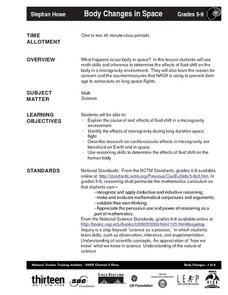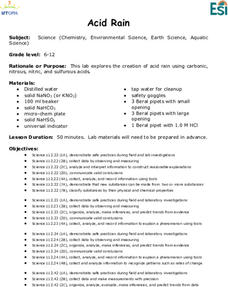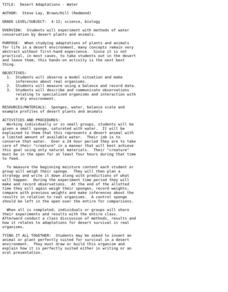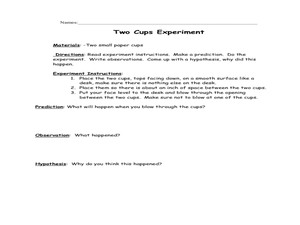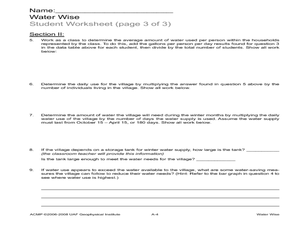Curated OER
The Frog and the Ol' Black Fly
Students explore frogs. In this cross curriculum literacy and frogs lesson plan, students predict the plot and then listen to the book The Wide-Mouthed Frog by Keith Faulkner. Students define "predator" and identify foods a frog...
Curated OER
Fred the Fish -- A River Ran Wild
Students apply cause and effect relationships to water pollution in a stream. In this pollution lesson students recognize the importance of clean water in their daily lives. Students accompany "Fred the Fish" as he travels down stream....
Curated OER
Prototypes and Model Designs
Fifth graders examine prototypes and model designs. In this engineering lesson plan, 5th graders build a prototype out of a deck of cards and test their design. Upon completion, students write a letter to an architect which includes the...
Curated OER
Growth of a River
Students evaluate geography by drawing an image in class. In this river lesson, students identify a list of vocabulary terms associated with bodies of water. Students identify how a river is formed and draw a picture of one including the...
Curated OER
The Spectrum of a Star
Tenth graders identify stars based on their line spectra. In this astronomy lesson, 10th graders analyze spectrograph and determine the elements present in the star. They explain the relationship between temperature and star classes.
Curated OER
Mississippi’s Electricity: From Generation to Consumption
Eighth graders discover how electricity is produced. In this physics lesson, 8th graders infer about the future of Mississippi's energy industry. They participate in a Smart Board interactive activity at the end of the lesson.
Curated OER
Chemical Bonding
Eighth graders identify the three main types of chemical bonds. In this chemistry lesson, 8th graders draw Lewis dot diagrams of elements and determine the bond formed. They create a model water molecule.
Curated OER
You Light Up My Life: Developing a Scientific Theory for What Fuels a Candle's Flame!
Students examine how candles work and how scientific theories are developed and tested. Students propose hypotheses about what is burning in a candle then perform tests in order to develop their scientific theory. After a teacher...
Curated OER
Body Changes in Space
Learners explain the cause of and effects of fluid shift in a microgravity
environment. Students identify the effects of microgravity during long duration space flight. Learners describe research on cardiovascular effects in microgravity...
Curated OER
Photosynthesis and Respiration
Eighth graders differentiate photosynthesis and respiration. In this biology lesson, 8th graders draw a diagram explaining these two processes. They answer a quiz after the lesson.
Curated OER
Cycles Review
Eighth graders discuss the four major cycles of matter. In this general science lesson, 8th graders decide which of the four is the most important. They share their opinion in class.
Curated OER
Introduction to Ecology
Eighth graders identify the living and nonliving components of an ecosystem. In this ecology lesson, 8th graders explain the role each organism plays. They participate in class discussion and answer a quiz at the end of the lesson.
Curated OER
Introduction to Biomes
Eighth graders identify the different kinds of biomes. In this life science lesson, 8th graders explain their importance in an ecosystem. They take a BrainPop quiz at the end of the lesson..
Curated OER
Remote Sensing
Ninth graders participate in a variety of activities designed to reinforce the concept of light and the electromagnetic spectrum. They research and analyze data from remotely sensed images. They present their findings in a PowerPoint...
Curated OER
"Julie of the Wolves"
Fifth graders research life in Alaska and compare life there to their lives in this lesson. They read "Julie of the Wolves." They research through the novel and other reference books facts about the Alaskan climate and geography. They...
Curated OER
Characteristics of Living Things
Students discuss the criteria for living things with their groups. They come to a consensus on at least five or more characteristics of a living thing. They determine if the lab samples are living, non-living, or other.
Curated OER
The Beaufort Scale: A Local Model
Students study the Beaufort Scale and use it to study wind in their community. In this wind study lesson, students watch a DVD about climate change and learn about the Beaufort Scale. Students complete a worksheet for the topic.
Curated OER
Acid Rain
Students create acid rain using carbonic, nitrous, nitric, and sulfurous acids.
Curated OER
Desert Adaptations: Water
Students experiment with methods of water conservation. In this water conservation lesson plan, students explore the importance of water for plants and animals in a desert biome.
Curated OER
Understanding Bernoulli's Principle
Fifth graders explain why we fly. In this space science lesson, 5th graders discuss Bernoulli's prinicple and its relation to flight.
Curated OER
Utah Archaeology
Students study past cultures of those who made areas of Utah their home by exploring the artifacts these cultures left behind. Students will explore different types of fossils and learn that fossils are evidences of past life.
Curated OER
Decision Making
Students study weather patterns and learn to make decisions based on the weather. In this weather instructional activity, students plan a potluck based on the weather. Students use a decision tree to brainstorm about the activity....
Curated OER
Layering the Air
Learners study the layer of the atmosphere. In this lesson on the atmosphere, students discuss the composition of the air around us and how the atmosphere was formed. Learners create a scale model of the layers of the atmosphere.
Curated OER
Water Wise
Students calculate their family's water consumption. In this water usage lesson, students discuss the water they use in their homes. Students complete the 'water wise' worksheets to tally their family's use of water. Students answer...
Other popular searches
- Inference and Observation
- Observation Inference Lab
- Observation Inference Demo
- Inference Observation
- Observation Inference Science










